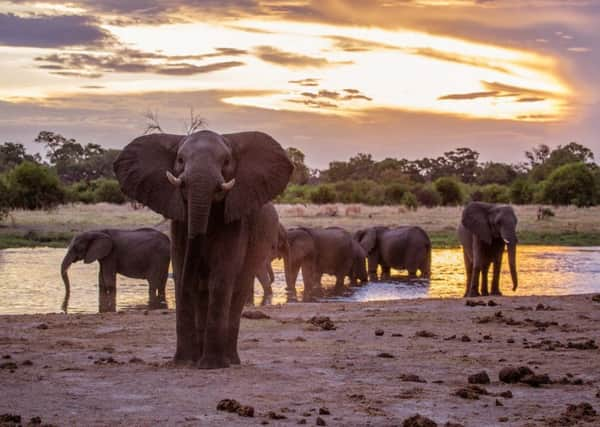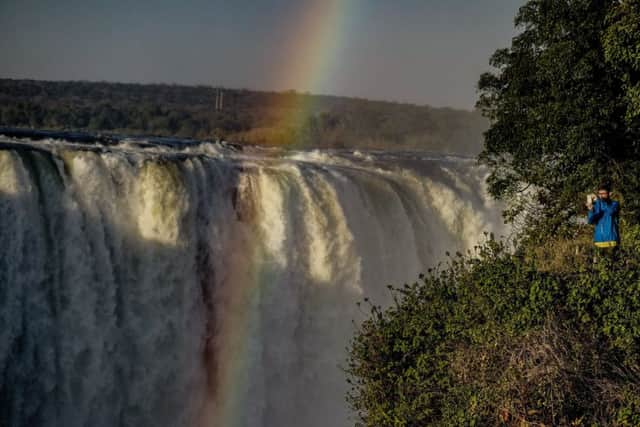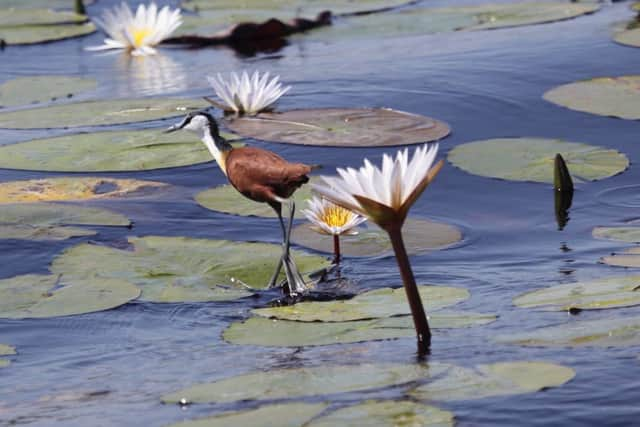Travel: Safari in Botswana then hop over to Zimbabwe for a view of Victoria Falls


A trip combining the Okavango in Botswana and Victoria Falls in Zimbabwe will shower you with memorable and surprising experiences.
An early treat comes with passport control at Maun airport, Botswana’s hub for visitors to the Okavango, where instead of bored or suspicious officials you are greeted – yes, greeted – with a happy face and a welcoming smile. When it comes to tourism, Botswana has cracked it: low impact/high cost is the simple algorithm – keep visitor numbers down but their expenses high; the revenue rolls in but with minimum effect on the environment.
Advertisement
Hide AdAdvertisement
Hide AdWhat this delivers is bespoke safari experiences in a country where 40 per cent of the land has been put aside for wildlife. Although it is the size of France, Botswana has only around two million people and they live mainly in the southeast of the country. While most of the land is covered by the sands of the Kalahari, Okavango in the north is a water wonderland for creatures from aardvarks to zebras.


A river that rises in Angola flows for hundreds of kilometres before dividing when entering Botswana and forming an inland delta, the largest in the world at 15,000 square kilometres. Its channels, lagoons, swamps and islands, and one of the most incredible wildlife sanctuaries on the planet, are not the territory of humans. Large wild mammals – elephants, lions, leopards, rhinoceroses, hippopotamuses, Cape buffalo – abound and so does the bird life in mesmerising colours: rollers in shades of powder blue and lilac; woodpeckers with golden tails; shrikes with dazzlingly crimson breasts.
The wildlife is managed by a series of “concessions”, vast areas of unfenced land that are leased to private companies for periods of 15 years before being put out to tender once again. Accommodation for travellers is of the boutique kind: a dozen rooms is the average, often in designer-style tented camps of the simple but luxurious kind. Camps are so spread out that small airstrips are used to connect them and upon arrival at Maun you are whisked off to one in a small aircraft. Before there is time to gather impressions of your whereabouts, you’re booked into
a camp and having lunch 30 metres
from a waterhole where some large


flat stones turn out to be lazy hippos basking in African sunshine. That was my experience arriving at the nine-roomed Qorokwe Camp, which opened at the end of 2017 in the southeast Okavango.
Camps like Qorokwe work on all-inclusive packages which cover meals, wines and spirits, laundry, daytime safaris and night drives. Given the small scale of the camps, evening meals tend to be communal affairs where you swap tales of wildlife encounters. There is little time to be idle and although there is often no wi-fi, the enforced digital detox passes unnoticed.
The Okavango’s mosaic of meandering waterways facilitate boat or canoe trips which become audio-visual treats as you float along listening to guffawing baboons, wheezing hippos, choruses of Angolan painted reed frogs and watching the chestnut and gold-coloured African jacana delicately step on water lily leaves looking for food.
In the north of Botswana the Linyanti River divides the country from Zambia and its waterways provide a year-round water source and attraction for wildlife.
This is the place to personally appreciate some unusual collective nouns: a dazzle of zebras, a twist of kudus, a tower of giraffes, a bloat of hippopotamuses. A waterway, the Savuti Channel, bisects the Linyanti, but it was a dry sand river for over a decade until it started to flow again in 2008. Camps like Duma Tau dot the lush woodland on the banks of the Savuti and staying at them means going to sleep with the grumbling bellows of hippos in the background. The lush vegetation attracts large herds of elephants while lions and wild dogs roam freely and are often to be seen.
Advertisement
Hide AdAdvertisement
Hide AdFrom northern Botswana it is hard to resist the short hop that takes you across to Zimbabwe and the Victoria Falls, especially now that the country has shed its recent grim history. The removal of Robert Mugabe – the first leadership change in 37 years – has created high expectations for the future and tourism is poised to make a dramatic comeback. The town of Victoria Falls, on the southern bank of the famed Zambezi River, is served by an airport of the same name and the Falls are on its doorstep.
Served by a shuttle bus from town, Victoria Falls Safari Lodge is a wood-and-thatch cathedral of a hotel on an elevated position. A must-see event here is a daily lunchtime “vulture feast” which brings White-headed vultures and endangered Hooded vultures flocking in to dine just metres from your seat. At night, a clearing in the forest is spotlit for viewing the hyenas which emerge warily from the dense greenery, and from the hotel’s à la carte restaurant you hear them crunching leftover bones from the vulture feast as you enjoy your own meal. A more edifying sound comes from a trio of singers with poignant choral renditions of Zimbabwean songs.
The Falls themselves are the prime reason for being here and they don’t disappoint: “Scenes so lovely must have been gazed upon by angels in their flight,” wrote David Livingstone when he first saw them, and even if you forgo a helicopter tour, viewing the frightening grandeur of the fast-flowing Zambezi and its torrential collapse as the world’s largest sheet of falling water plunges into a dark gorge, you’ll see what he meant. A paved walkway with over a dozen viewpoints makes for safe viewing and a memorable conclusion to a trip to Botswana that begins with a smiling welcome at passport control.
FACTFILE
The new fifth edition of Bradt’s Botswana guide, a copy of Birds Of Botswana by Peter Hancock and Ingrid Weiersbye, and Berndt & Feytag’s map of Botswana are all contenders for a place in your luggage.
Mahlatini Luxury Travel (02890 736 050; www.mahlatini.com) offers a six night luxury holiday at Wilderness Qorokwe Camp and Duma Tau Camps (all inclusive) and Victoria Falls Safari Lodge (Bed & Breakfast) (2 nights at each camp) from £5,400 per person sharing. Includes international flights from London, light aircraft and road transfers and scheduled safari activities in Botswana.